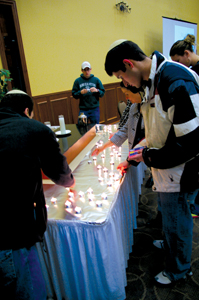
Students at Binghamton University mourned the loss of more than 170 lives from the terrorist attacks last week in Mumbai, India, at a memorial Tuesday and plan to do so again this afternoon.
A memorial service was held at the Chabad Center to honor members of the Jewish community killed in the attacks, specifically two colleagues of BU’s Chabad Center, Rabbi Gavriel Holtzberg and his wife, Rivkah, who died at the Chabad center they directed in Mumbai.
Joshua Khakshoor, a sophomore economics major, said around 200 students and local residents attended the memorial service.
“Each member of the Chabad faculty spoke about those who sacrificed their lives to help the Jewish community in Mumbai,” he said. “A transfer student from India who attended the Chabad Center in Mumbai also spoke at the memorial.”
On Nov. 26, 10 gunmen hijacked a vessel in Pakistan and entered Mumbai, India’s financial capital, targeting 10 locations in the city in an attack that lasted until Nov. 29 and killed more than 170 people. The attacks were conducted in major tourist locations including the Taj Mahal Hotel, Leopold Caf√É.√Ü.√É.√©, Cama Hospital and an Orthodox Jewish-owned Chabad House.
BU has a large Indian population, with over 390 students from India currently studying at the University, according to a press release from the University. Many of the students are from Mumbai and currently have family in the city.
An unknown terrorist organization who referred to itself as Deccan Mujahideen initially claimed responsibility, but The Associated Press reported on Dec. 1 that a top Indian police officer said Sunday he believed the attackers were from Lashkar-e-Taiba. The report states that Lashkar-e-Taiba has long been considered a creation of the Pakistani intelligence service to help fight India in the disputed Kashmir region.
“India and Pakistan are two nuclear armed countries with a history of warfare,” said Patrick Regan, a professor of political science at BU. “To the extent that this attack increases the tension, that is a dangerous situation.”
“If India blames Pakistan, or if evidence comes out that links active support by the Pakistani military or intelligence units, then there is a real concern for stability in the region,” he said.
Vice President of the Indian Graduate Student Organization (IGSO) Nitish Tyagi, who is also a native of Mumbai, said he was not happy with how the Indian government is handling the attacks.
“No one is very happy because everyone sees that the government knows who has done this,” he said. “As of now, if they have realized who was behind the attacks, they should be taking action immediately. They should bring them to justice and not keep waiting for another attack.”
The attacks took place in what is considered Downtown Mumbai, Tyagi said, a popular hangout place for many college students in India.
“The attacks affect every section of society,” he said. “Old, young, everyone has been affected, everything has been destroyed.”
According to Regan, the pressures on the Indian government after the attacks are considered similar to the pressures the United States government faced after 9/11.
“This political pressure could bring down the current government, or I suppose it is possible that the military takes over in Pakistan,” he said. “I have no idea whether either of these are likely, but if you were to watch closely the reaction of the Indian people, you would get a sense of the stability of the government, or alternatively, the likely response in Pakistan.”
The IGSO will also hold a peace rally and a candlelight vigil on Friday at 4:30 p.m.
“The rally will start from the Dickinson amphitheater,” Pratik Tanna, president of the IGSO, said. “If there is no snow the vigil will be held outside at the amphitheater. We have the dean of the School of Management and other professors and staff members speaking at the vigil.”
The vigil will be open to the public.


